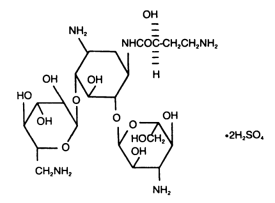Amiglyde-V Intrauterine Solution
This treatment applies to the following species: Company: Zoetis
Company: Zoetis
(amikacin sulfate injection)
Veterinary Solution
Equivalent to 250 mg amikacin per mL
Amiglyde-V Intrauterine Solution Caution
Federal (USA) law restricts this drug to use by or on the order of a licensed veterinarian.
Description
Amikacin sulfate is a semi-synthetic aminoglycoside antibiotic derived from kanamycin. It is C22H43N5O13•2H2SO4, D - streptamine,0 - 3 - amino - 3 - deoxy - α - D - glucopyranosyl - (1®6) - 0 - [6 - amino - 6 - deoxy - α - D - glucopyranosyl - (1®4) - N1-(4-amino-2-hydroxy-1-oxobutyl)- 2-deoxy-, (S)-, sulfate (1:2) (salt).

The dosage form supplied is a sterile, colorless solution. The solution contains, in addition to amikacin sulfate, USP, 2.5% sodium citrate, USP with pH adjusted to 4.5 with sulfuric acid and 0.66% sodium bisulfite added. The multi-dose 12 gram-48 mL vial contains 0.01% benzethonium chloride, USP as a preservative.
Action
Antibacterial Activity
The effectiveness of AMIGLYDE-V (amikacin sulfate injection) in infections caused by Escherichia coli, Pseudomonas sp and Klebsiella sp has been demonstrated clinically in the horse. In addition, the following microorganisms have been shown to be susceptible to amikacin in vitro1, although the clinical significance of this action has not been demonstrated in animals:
● Enterobacter sp
● Proteus mirabilis
● Proteus sp (indole positive)
● Serratia marcescens
● Salmonella sp
● Shigella sp
● Providencia sp
● Citrobacter freundii
● Listeria monocytogenes
● Staphylococcus aureus (both penicillin-resistant and penicillin-sensitive)
The aminoglycoside antibiotics in general have limited activity against gram-positive pathogens, although Staphylococcus aureus and Listeria monocytogenes are susceptible to amikacin as noted above.
Amikacin has been shown to be effective against many aminoglycoside-resistant strains due to its ability to resist degradation by aminoglycoside inactivating enzymes known to affect gentamicin, tobramycin and kanamycin2.
Clinical Pharmacology
Endometrial Tissue Concentrations
Comparisons of amikacin activity in endometrial biopsy tissue following intrauterine infusion with that following intramuscular injection of AMIGLYDE-V in mares demonstrate superior endometrial tissue concentrations when the drug is administered by the intrauterine route.
Intrauterine infusion of 2 grams AMIGLYDE-V daily for three consecutive days in mares results in peak concentrations typically exceeding 40 mcg/g of endometrial biopsy tissue within one hour after infusion. Twenty-four hours after each treatment amikacin activity is still detectable at concentrations averaging 2 to 4 mcg/g. However, the drug is not appreciably absorbed systemically following intrauterine infusion. Endometrial tissue concentrations following intramuscular injection are roughly parallel, but are typically somewhat lower than corresponding serum concentrations of amikacin.
Safety
AMIGLYDE-V is non-irritating to equine endometrial tissue when infused into the uterus as directed (see ADMINISTRATION AND DOSAGE). In laboratory animals as well as equine studies, the drug was generally found not to be irritating when injected intravenously, subcutaneously or intramuscularly.
Although amikacin, like other aminoglycosides, is potentially nephrotoxic, ototoxic and neurotoxic, parenteral (intravenous) administration of AMIGLYDE-V (amikacin sulfate injection) twice daily at dosages of up to 10 mg/lb for 15 consecutive days in horses resulted in no clinical, laboratory or histopathologic evidence of toxicity.
Intrauterine infusion of 2 grams of AMIGLYDE-V 8 hours prior to breeding by natural service did not impair fertility in mares. Therefore, mares should not be bred for at least 8 hours following uterine infusion.
Amiglyde-V Intrauterine Solution Indications
AMIGLYDE-V is indicated for the treatment of uterine infections (endometritis, metritis and pyometra) in mares, when caused by susceptible organisms including Escherichia coli, Pseudomonas sp and Klebsiella sp. The use of AMIGLYDE-V in eliminating infections caused by the above organisms has been shown clinically to improve fertility in infected mares.
While nearly all strains of Escherichia coli, Pseudomonas sp and Klebsiella sp, including those that are resistant to gentamicin, kanamycin or other aminoglycosides, are susceptible to amikacin at levels achieved following treatment, it is recommended that the invading organism be cultured and its susceptibility demonstrated as a guide to therapy. Amikacin susceptibility discs, 30 mcg, should be used for determining in vitro susceptibility.
Administration And Dosage
For treatment of uterine infections in mares, 2 grams (8 mL) of AMIGLYDE-V, mixed with 200 mL 0.9% Sodium chloride injection, USP and aseptically infused into the uterus daily for three consecutive days, has been found to be the most efficacious dosage.
Contraindications
There are no known contraindications for the use of AMIGLYDE-V in horses other than a history of hypersensitivity to amikacin.
Precautions
Although AMIGLYDE-V is not absorbed to an appreciable extent following intrauterine infusion, concurrent use of other aminoglycosides should be avoided because of the potential for additive effects.
Adverse Reactions
No adverse reactions or other side effects have been reported.
Warning
Do not use in horses intended for human consumption.
In vitro studies have demonstrated that when sperm are exposed to the preservative which is present in the 48 mL vials (250 mg/mL) sperm viability is impaired.
Supply
AMIGLYDE-V (amikacin sulfate injection) Veterinary Solution is supplied as a colorless solution which is stable when stored at or below 25°C (77°F). Use contents within 3 months of first vial puncture.
48 mL vial, 250 mg/mL
Store at or below 25°C (77°F).
REFERENCES
1. Price, K.E., et al: Microbiological Evaluation of BB-K8, a New Semisynthetic Aminoglycoside. J Antibiot 25: 709-731, 1972.
2. Davies, J., Courvalin, P.: Mechanisms of Resistance to Aminoglycosides. Am J Med 62: 868-872, 1977.
Approved by FDA under NADA # 127-892
Manufactured and Distributed by: Zoetis Inc., Kalamazoo, MI 49007
Revised: July 2019
40028299
CPN: 3690430.3
333 PORTAGE STREET, KALAMAZOO, MI, 49007
| Telephone: | 269-359-4414 | |
| Customer Service: | 888-963-8471 | |
| Website: | www.zoetis.com |
 |
THIS SERVICE AND DATA ARE PROVIDED "AS IS". DVMetrics assumes no liability, and each user assumes full risk, responsibility, and liability, related to its use of the DVMetrics service and data. See the Terms of Use for further details. |

Copyright © 2025 Animalytix LLC. Updated: 2025-03-02
